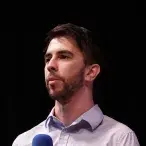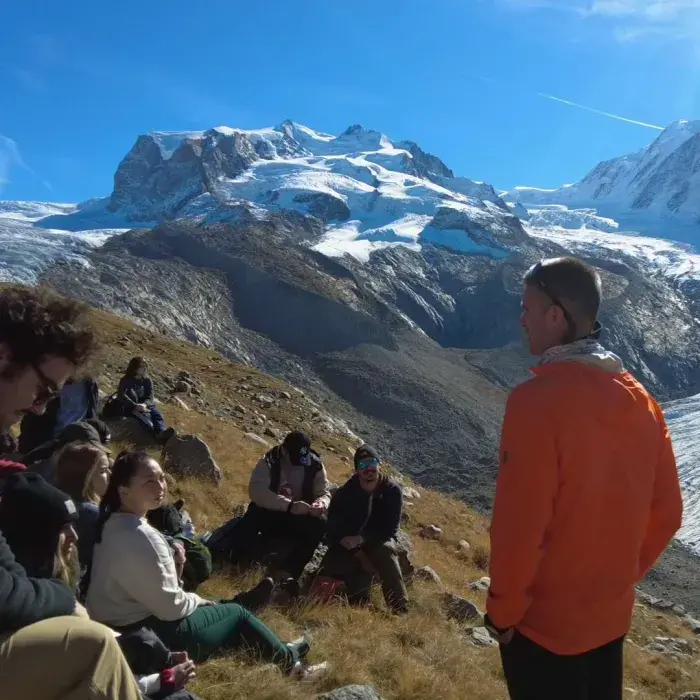Academic Travel and Career Development
When starting our Career Development course, I thought, "I don't NEED this class. What more can I learn?" I didn't see the need because I was confident in my professional skills, resume, and LinkedIn profile. I was so confident in myself that I approached Ebonie Rayford, Assistant Dean of Student Life and Career Strategy, saying that I didn't need it and wanted to withdraw from the class. She urged me to go into it and see what could be done for me and maybe I would learn some new things. I didn't know how right she would be.
Even throughout the semester, I only applied a little effort to the class. I didn't have much time and didn't want to make any more. But travel gets you interested in things that you never expected to be interested in before.
I went into Academic Travel with no expectations. I knew that we would be going to Prague and that we would be meeting a few alumni, but I didn't have many thoughts of what I would do besides eating delicious meals all over the city. I thought it would be a relaxed trip where I wouldn't be motivated to do anything, feeling like I wanted to party and be on vacation. But the truth is that we rode in luxury and laughed and joked on the ride to Prague until Guido Schlemback, our co-teacher, asked to see my resume to give me tips on improving it. None of us knew at the time, but that helpful suggestion lit a fire in me so that the rest of the week was dedicated to career development.
The first person we met in Prague was Matt Slavik. He was friends with Ebonie and studied at UC San Diego in environmental science. He was funny and a great conversationalist, but he said he worked at an IT start-up and didn't use his environmental science degree much in his career. I thought, "Why get a science degree if you don't use it?" It seemed weird to me, but his admission kept me thinking about my degree and what I would do with it after graduation.
One assignment at the beginning of travel gave us the opportunity to meet with someone in our field and have an informational interview with them. I miraculously met with Milan Ruttner, an ESG officer with 25 years of experience. I thought it would be rude to not only Milan but also Ebonie and Guido if I wasn't prepared with questions and cared about this interview. I researched Milan and his company and read articles posted about him. I was shocked when I learned he had a degree in Human Resources and was not working in HR. "Another person that doesn't use their degree in their field?" I thought. I had two key questions I HAD to ask Milan. "If you studied HR, how come you don't work in HR?" and "Why did you take time out of your day to talk to me?" He responded: "The opportunity arose, and I took it and fell in love with it," the same as Matt, and "You showed drive and passion, and that speaks volumes to people who care about the future working generation." I started applying myself to this course and began reaping benefits. These responses kept me interested. I felt like a detective wanting to know why everyone was doing their chosen job.
That night I stayed up until 1:30 in the morning working on my resume and LinkedIn profile, knowing we had to be up early the next day. The next morning, even though I usually feel horrible when I get too little sleep, I spent the whole time asking questions to Guido and Ebonie. I don't even remember what we did that day, but I know that I asked more questions than a curious child.
Our plan for the week was to have our informational interview, meet with alumni, and for Guido and Ebonie to be there for any questions we had. So the itinerary was precisely that. We met with alumni, had a day for our interviews, and allotted time to ask questions.
The next exciting event allowed us to meet a handful of alumni and join them for a wine tasting at a vineyard owned by hosting alumni: brothers Stepan and Adam Tahanand Moritz Straube. Three amazing people to meet! This part of our travel showed the most significant components that Ebonie wanted us to get out of the course: networking with people and building connections that last. Naturally, my curiosity hit me again, so I had to ask what the alumni were doing now. Though it should not have been a surprise at this point, Stepan, Adam, and Moritz shared that they all worked in different fields than their degrees. This fact worried me about my future, what my degree was worth, and what I would do with it.
I quickly became good friends with Moritz. We hit it off in a matter of seconds. Moritz's story was the most relatable to my own experiences. He worked at a big-name software development company, working about 70 hours a week. He said that he hated it and did not want to be doing that for the rest of his life. So instead, he wanted to do something he loved: video games. Moritz co-founded the first E-sports team in the Czech Republic. His transition to something completely different that he is passionate about made him love his job. He said he felt like he never worked a day in his life.
This final stretch of our travel was the most eye-opening. Hearing from Moritz showed me that I can do what I'm passionate about and really enjoy my life--that even though I am majoring in finance, I can use my skills to benefit people in the way that I want. He showed me that even though I don't know what I want to do yet or what I will be doing after I graduate, I will find something I love and never work a day in my life. I knew that to enjoy work, I must work somewhere aligned with my morals and ethics. After sharing this realization with Guido, he tasked me to think of 20 companies I would like to work for and why. That night, although exhausted, I sat and worked on it. Initially, I thought, "I'll just put 20 down to please Guido." Then I thought, "No! I actually care about where I want to work; this is about me. I'm going to take this seriously." I sat and researched for four hours. Finally, I went to sleep feeling satisfied with my work at 3:30 in the morning. I'm glad I put in the work to get an idea of what my future holds.
I don't think I can forget the next day when I shared my work with Guido and Ebonie. Ebonie told me she was truly impressed with the work I had been putting in and didn't expect it because of how I had been applying myself earlier in the semester. This validation felt great since it showed me that not only did I notice the growth in myself, but so did she.
I had an interview on the last day and was visibly nervous. I would have to sell who I am to a hiring manager and didn't know how well I would do. Guido took me and helped prepare me. After talking researching the company, position, and hiring manager, Guido enabled me to be fully prepared for this interview. And if it was Guido, or maybe I had it in myself, I don't know, but I aced the interview and was complimented at several points throughout.
This has been a hectic description of my travel course. However, I learned vital lessons from this travel course. I didn't believe that there was anything I could learn from this class initially, but I was wrong. I learned how to speak with people and get information on the workforce and job life when just having a little time together. I learned how to restructure my resume to that companies would reach out to me and be hooked by my points. I learned how to create a professional LinkedIn profile and use it as a good social media platform to highlight my skills. I learned how to sell myself when talking to recruiters, emphasize my strong points, and get them interested in me as an applicant. I learned that the Franklin community is not just on campus; we have thousands of alumni that love being a part of Franklin and treat the rest of us Franklin students like family. And lastly, and most importantly, I saw people's perspectives after leaving college and going into the workforce.
Upon reflection, I am very happy that I took the Academic Travel course. In one week, I learned more skills in this course pertaining to career development than I had in the past four years.


